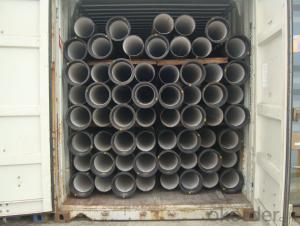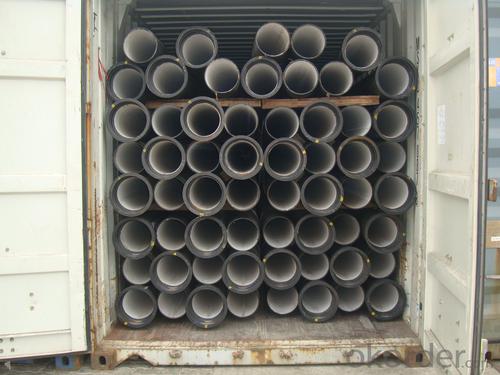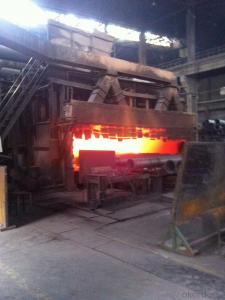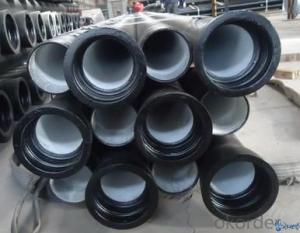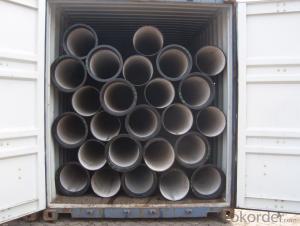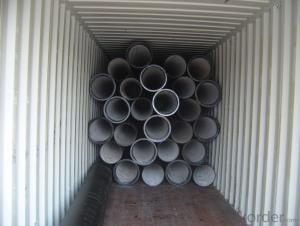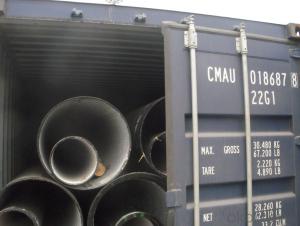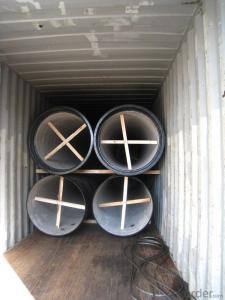DUCTILE IRON PIPES AND PIPE FITTINGS K8 CLASS DN1000
- Loading Port:
- Tianjin
- Payment Terms:
- TT OR LC
- Min Order Qty:
- 22 pc
- Supply Capability:
- 3000 pc/month
OKorder Service Pledge
OKorder Financial Service
You Might Also Like
Material : Ductile Cast Iron
Size Range : DN 80mm to DN 2000mm
Unit Effective Length : 6m or 5.7m
Manufacture Standard: ISO 2531:1998/ EN 545:2006/EN 598:2007
Annual capacity : 200,000 tons
Coating Exterior: Zinc 130g/m2 according to ISO 8179-1 and bitumen coating 70 microns.
Cement Interior: Portland Cement/ High Alumina Cement/ Sulphate Resisting Cement Lining according to ISO 4179
Special requirements on external coating and internal lining can be applied
We also provide accessories such as SBR/EPDM rubber gaskets, lubricant paste, pipe caps, PE sleeves, etc.
Additional Parts:
Each pipe is strictly inspected according to related standard to ensure permanently high performance.
Easy Installation at site and service free for life
Long Service Lifespan
Quotation will arrive you within 24hours once we get your inquiry.
We guarantee offering you a competitive price.
A copy of original inspection reports of pipes will be offered after shipment.
Photos of loading process will be sent to the customer after shipment effect.
We will follow-up the delivery progress after shipment effect and update to the customer on weekly basis.
- Q: What are the different joint restraint systems available for ductile iron pipe?
- Some of the different joint restraint systems available for ductile iron pipe include mechanical joint restraints, push-on joint restraints, and restrained joint systems.
- Q: Can ductile iron pipes be used for trench crossings?
- Yes, ductile iron pipes can be used for trench crossings. Ductile iron pipes are known for their high strength and durability, making them suitable for various applications including trench crossings. They have the ability to withstand heavy loads and provide increased resistance to external forces, making them a reliable choice for such purposes.
- Q: What is the excavation width of ductile iron pipes with diameters greater than 1400?
- Then, according to the soil characteristics, different slopes are calculated, and the width of the excavation is calculated according to the depth and slopeIf the soil is soft, high water content and easy to collapse, the excavation width will be wide, otherwise the slope will be steep and the excavation width will be narrow
- Q: How does ductile iron pipe perform in corrosive soils?
- Ductile iron pipe performs exceptionally well in corrosive soils due to its inherent corrosion resistance properties. The pipe is made from a unique composition of iron, carbon, and other elements that enhance its durability and resistance to corrosion. One of the key features of ductile iron pipe is its protective lining. The interior of the pipe is lined with either cement mortar or a special epoxy coating, which acts as a barrier between the corrosive soil and the pipe itself. This lining protects the iron from coming into direct contact with the soil, preventing corrosion. Additionally, ductile iron pipe has a higher resistance to external corrosion when compared to other materials like steel. It can withstand the chemical reactions caused by acidic or alkaline soils and remains unaffected by the corrosive elements present in the ground. This makes it an ideal choice for installation in areas with highly corrosive soils. Furthermore, ductile iron pipe has a long service life, further contributing to its performance in corrosive soils. The durable nature of the pipe and its resistance to corrosion ensure that it can withstand the challenges posed by corrosive soils for several decades without significant degradation. In conclusion, ductile iron pipe excels in corrosive soils due to its protective lining, resistance to external corrosion, and long service life. Its ability to withstand the harsh conditions presented by corrosive soils makes it a reliable and durable choice for various applications, including water distribution, sewage systems, and industrial pipelines.
- Q: What is the expected corrosion protection system for ductile iron pipes?
- Typically, the expected corrosion protection system for ductile iron pipes involves a combination of external coatings, internal linings, and cathodic protection. To protect against corrosion, external coatings are applied to the pipe's exterior surface. These coatings, usually fusion-bonded epoxy, polyethylene, or polyurethane, act as a barrier against corrosion from soil, water, and chemicals. Furthermore, they play a crucial role in prolonging the pipe's lifespan. In order to safeguard against corrosion caused by the transported fluid, internal linings are applied to the pipe's interior surface. These linings, which can be made of cement mortar, epoxy, or polyurethane, provide a smooth and protective layer that prevents the formation of rust and scale. Cathodic protection is an electrochemical technique employed to shield ductile iron pipes from corrosion. It involves the utilization of sacrificial anodes or impressed current systems to generate a protective electrical current that counteracts the corrosion process. By employing this method, the formation of rust is prevented, thereby extending the pipe's longevity. It is important to acknowledge that the specific corrosion protection system for ductile iron pipes may differ depending on the application and environmental factors. To determine the appropriate corrosion protection system for a specific ductile iron pipe installation, consulting with corrosion experts and adhering to industry standards and guidelines is of utmost importance.
- Q: Does the cast iron have size 250? What's the performance?
- Ductile iron does not have size 250. Ductile iron is the beginning of QT, QT400-15, QT450-10, QT500-7 is the general use of nodular cast iron brand. Nodular cast iron welding can be determined, this should be in some high strength cast iron equipment used more, the tensile strength of normally ductile cast iron welding in welding is higher, is worse than the grey cast iron, it is actually very difficult to distinguish with the naked eye is ductile iron or cast iron the iron in the repair equipment, we usually use WE777 special cast iron electrode universal wide welding, but it is only for maintenance use, the effect is really good, reducing the risk of cracking and high strength welding rod matching to ensure the strength of welding seam.
- Q: There are several forms of flexible interfaces for Spigot Cast Iron Pipes
- At present, the flexible interfaces include slip type rubber ring interface, R rubber ring interface, flexible mechanical interface, A type and flexible mechanical interface, K type.1. slip in rubber ring interfaceRubber ring and pipe are supplied by supply factory. A rubber ring is installed before the socket in the working surface and no tower water supply equipment Jack working surface cleaned, the rubber ring embedded concave socket tip in the rubber ring, and the exposed surface and the socket of the working face, coated with lubricant has no influence on the quality of the rubber ring. The water supply equipment socket end chamfering and rubber ring even after contact with special tool socket socket will push, push people to mark depth should be set in advance, before the festival, before the two push interface depth and review has been.
- Q: How is ductile iron pipe protected against external corrosion?
- To ensure the durability and longevity of ductile iron pipe, various methods are employed to protect it from external corrosion. One commonly used method is the application of protective coatings. Typically, a layer of zinc or asphaltic material is applied to the pipe, creating a barrier between the iron and the surrounding environment. This coating prevents direct contact between the pipe and corrosive elements like soil, moisture, and chemicals, thereby reducing the risk of corrosion. Another layer of protection is provided by wrapping the ductile iron pipe with polyethylene or polypropylene tape. This tape acts as a physical barrier, shielding the pipe from moisture and other potentially corrosive substances. Great care is taken during the application process to ensure complete coverage and adherence to the pipe's surface. Cathodic protection is also commonly used to safeguard ductile iron pipes from external corrosion. This technique involves installing sacrificial anodes or impressed current systems near the pipe. These anodes generate a protective electrical current that counteracts the corrosion process, effectively inhibiting the deterioration of the pipe's surface. Proper installation practices also play a crucial role in preventing external corrosion. It is important to bury the pipe at an appropriate depth, ensuring adequate soil coverage. This minimizes exposure to corrosive elements and maintains the integrity of the protective coatings. Additionally, using corrosion-resistant bedding materials and employing proper backfilling techniques can further enhance the pipe's resistance to external corrosion. In conclusion, a combination of protective coatings, tape wrapping, cathodic protection systems, and proper installation practices ensures the protection of ductile iron pipe against external corrosion. These measures work together to provide a strong defense against corrosive forces, ensuring the pipe's reliability and longevity in various applications.
- Q: How long do ductile iron pipes last?
- Ductile iron pipes possess an impressive durability and extended lifespan. Typically, these pipes can endure from 80 to 100 years, with certain instances even reaching an impressive 150 years. The exceptional longevity of ductile iron pipes can be attributed to their sturdy construction, enabling them to withstand high-pressure surroundings, combat corrosion, and endure severe weather conditions. Furthermore, ductile iron pipes have established a commendable reputation for their reliability and performance, rendering them a favored option for water and wastewater infrastructure projects worldwide. By conducting regular inspections and implementing maintenance measures, the lifespan of ductile iron pipes can be further prolonged, assuring their continued service for numerous decades to come.
- Q: Are there any specific standards or regulations for ductile iron pipe?
- Yes, there are specific standards and regulations for ductile iron pipe. The American Water Works Association (AWWA) has established standards such as AWWA C151 for ductile iron pipe, which outlines the minimum requirements for manufacturing, testing, and installation. Additionally, various countries and regions may have their own specific regulations and standards for ductile iron pipe to ensure its quality and performance in different applications.
Send your message to us
DUCTILE IRON PIPES AND PIPE FITTINGS K8 CLASS DN1000
- Loading Port:
- Tianjin
- Payment Terms:
- TT OR LC
- Min Order Qty:
- 22 pc
- Supply Capability:
- 3000 pc/month
OKorder Service Pledge
OKorder Financial Service
Similar products
Hot products
Hot Searches
Related keywords
